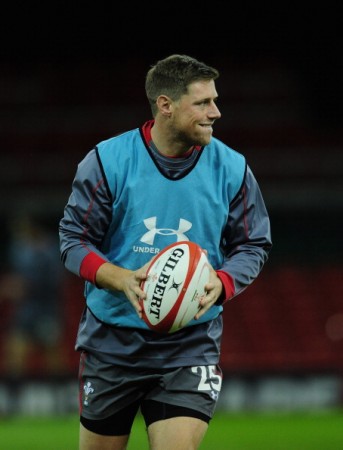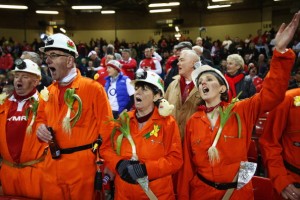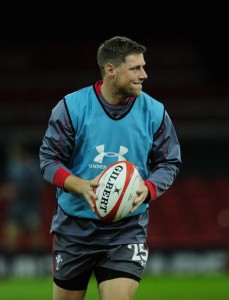
Plenty to ponder: Sam Warburton is the first Welsh player to sign a central contract but much is still unresolved
By Paul Williams
Poor timing of central contracts
RUGBY IS all about timing. Time your run too early – it’s a forward pass. Time your run too late – you get smashed by the defensive line. Time your central contracts too late and you lose Jon Davies, George North, Dan Lydiate, Jamie Roberts, Mike Phillips, Ian Evans, Leigh Halfpenny… January in Welsh rugby saw the central contracting of Sam Warburton.
And whether you agree with central contracts or not, and there are valid reasons on both sides of the debate, it does seem strange to do it after the horse has bolted. In fact half of the Welsh stable have bolted to England and France. It has been reported that the WRU may now, thanks to sponsorship, have a cash pot capable of centrally contracting £2 million pounds worth of Welsh players – that’s roughly seven. Or to put it another way – the entire list of players that are mentioned above. Frustrating doesn’t cover it.
The desperate search for a messiah
The current search for a messianic figure in Welsh rugby administration has reached biblical proportions in January. In the absence of any numerical, mathematical or scientific consensus on how Welsh rugby should be run – Wales has started desperately reaching for a miracle. Currently many are reaching for the preaching of Mr David Moffett. Many of his disciples on social media have even adopted his image as their profile picture.
Moffett seems an unusual choice for such devotion. Particularly from those who stand on the regional side of the divide. This is the man who has declared an interest to gain a seat on the WRU. But he also declared, on a recent televised debate, that he knows more about ‘central contracting’ than many in Wales. Which is an unusual point on which to garner regional support. Regional Rugby Wales (RRW) are diametrically opposed to central contracts and you would assume that their supporters are too. Mr Moffett’s sudden return to prominence in Welsh rugby may be a sign of desperation, not resolution.
Welsh supporters turn on the Welsh team
Welsh rugby has been cannibalising itself for the last two years. At times, relations between the Welsh Rugby Union (WRU) and RRW have looked like an out-take from the film ‘Alive’. However, January saw the situation slide even further. Some supporters of Welsh rugby are now beginning to turn on the Welsh team itself. It’s a worrying paradigm shift. During the last 30 years Welsh rugby has experienced some frankly, epic lows. The game in Wales has endured some crippling defeats against ‘lesser’ nations, the ‘Rebel Years’, the exodus of players ‘up north’ and the formation of the regions – but nobody ever turned on the national team. Ever.
It is a barometer of current feeling that some supporters are threatening to not support the Welsh team during the Six Nations by boycotting tickets and refusing to buy Welsh merchandise. However, whilst the intentions may be legitimate the action may be short-sighted. This current crisis is purely about money – for both the regions and the WRU. Actively limiting the amount of money that pours into Welsh rugby helps neither side. It seems like cutting your nose off to spite your face. In fact it’s like cutting your head off to spite your face.
Sam Warburton takes another hit
Sam Warburton is used to taking hits. He usually takes about 10 -14 a game. And that’s excluding the smacks he takes whilst being cleared out as he attempts another jackal. However, the criticisms that he has taken over his central contract must have hurt more than any swinging elbow that he has received in a ruck.
And just to be clear, criticism doesn’t solely mean aggressive trolling on Twitter – Warburton has received a few frowns from many a quarter. It seems very unjust. None of this is Warburton’s fault. At all. It’s not his fault that he’s the Welsh captain. It’s not his fault he was born in Cardiff, that he was the Lions captain and the dearth of revenue streams in Welsh rugby certainly isn’t his doing. Perhaps more unusual is that he has received more negative responses for actually choosing to stay in Wales than those who have chosen to leave. It’s a strange world in Welsh rugby at the moment…
Priestland or Biggar or Hook?
There are many worthwhile discussions currently taking place in Welsh rugby at the moment. One discussion that isn’t, is which of the above play at outside half for Wales. It’s like deciding which film is best – The Godfather, One Flew over the Cuckoo’s Nest or Apocalypse Now. They’re all gifted for slightly different reasons. After four rounds of the Heineken Cup Dan Biggar was the tournament’s joint-highest point scorer. Biggar has demonstrated a complete kicking game from hand and tee – but it is perhaps the presence of the impeccable Leigh Halfpenny that renders Biggar’s cultured feet less important.
Which leads neatly onto Rhys Priestland’s feet – but for a very different reason. Priestland’s desire to stand flat has had an enormous impact on the Scarlet’s backline. Standing three yards flatter makes the gainline three yards nearer – something that Jamie Roberts and Scott Williams will relish. And then there’s James Hook – the Swiss Army Knife of Welsh rugby. Perhaps a more pressing selection question is why isn’t Samson Lee on the bench, but that’s for another day.









